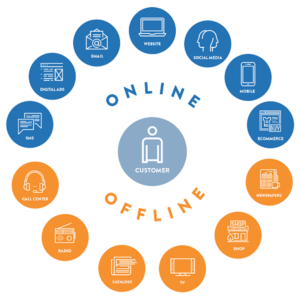Omnichannel marketing is a strategy for restaurants that can drive greater customer loyalty, brand awareness, and repeat visits from guests.
Omnichannel marketing is a common strategy in many industries, including retail, entertainment, and eCommerce. The restaurant industry has been less inclined to embrace omnichannel strategies, although some sectors, notably quick-service restaurants, have been more enthusiastic about the approach.
Many hospitality businesses already operate over a variety of channels. They use email, SMS marketing tools, online advertising, and other tactics, typically known as multichannel marketing. Uniting them into one strategy with the guest at the center is key to exploiting the power of omnichannel.
The Guest Experience
The key thing to remember about omnichannel marketing is that it’s centered on the guest. Where a typical multichannel marketing strategy may include many of the same elements, it starts with the business and pushes messages out from there. In an omnichannel approach, the transition from marketing to sales is seamless, and the flow of information goes both ways, to deliver a seamless and consistent experience across all methods.
In a typical multichannel approach, a customer may receive a notification via email, SMS, or an app that there is an offer or special if the guest sees the offer on their phone but decides to engage via an online ordering system that link may be lost. This is because one of the downfalls of a multichannel approach is that the various communication tools are isolated. Returning guests don’t want to be treated as if they were a new customer.
Conversely, by thinking about putting the guest in the center, establishments can ensure that no matter how the guest chooses to engage, the business is equipped to serve them in the manner they prefer. Although this requires more effort and technical capabilities by having access to the guest’s primary data and specific information such as favorite orders, special requests, and dietary restrictions, this allows you to tailor your message and avoid situations that disenfranchise your guests – such as sending a two for one prime rib offer to a guest who is a vegetarian for example.

It Begins with Data
It’s difficult to know who your guests are and their preferences without having the technical capabilities and infrastructure to do so. One of the most effective methods of refining your data strategy is to implement a loyalty program. By incentivizing guests to establish a data relationship, you can build a foundation of guest knowledge from which your marketing efforts can grow. As guests interact with the business, their profile grows to allow more frequent, relevant, and personalized messages which resonate far better than generic broadcast marketing.
Be Consistent, Be on Brand
When planning out an omnichannel approach, it’s vital to remember that your brand is your identity and that consistency in your approach will help develop long-term relationships with your guests. For instance, if an establishment is centered around fine dining, but has an online menu that doesn’t travel well, is presented poorly, or is inconsistent with the offerings for dining-in, then guests feel disconnected, and trust in the brand erodes. Your marketing channels are a direct extension of your vision, treat them with the same attention and care you do every other element in the business.
When Starting Out, Do Simple Well
It’s tempting to envision a massive omnichannel web where your business utilizes GPS location marketing, and machine learning, and sophisticated data-analytics, but unless your organization is already at the forefront of the marketing wave, keep expectations and goals realistic. Begin by outlining a simple strategy, communication plan, and workflow. Map out how a customer who receives an offer or communication then engages with your business. Are you able to identify who they are when they respond, regardless of channel? Was the initial offer tailored to them as a guest? If not, why? How can you collect the information to make more tailored communications? Is there an opportunity to help them build out their guest profile, or enroll in your loyalty program? By doing fewer things well, you can build the foundation that will allow you to grow into more sophisticated capabilities.
Leverage Your Network
Every demographic your guests belong to has a presence on social media, and their decisions are heavily influenced by other consumers. These guests are more likely to purchase after seeing a reference or referral on social media. When planning your strategy, consider how you can get guests to also engage with you on the social media platforms where they are active. Many people are familiar with the concept of influencers on social media but don’t forget that there are many opportunities to connect with people who already know and love your brand, who can act as ambassadors if you engage with them.
Also, consider the demographics of your guests. What platforms are they active on? By segmenting your customers as granularly as possible, you can make better marketing decisions, and advertising spend even without having the capability to personalize the message. For instance, if you know that your older guests respond well to offers of a free appetizer and that they tend to congregate on Facebook, you can tailor promotions for that group differently from your offerings on Instagram which may have a younger demographic that responds to a different type of promotion, perhaps a drink special or happy hour. This segmentation is a way to not only tailor your business to your guest’s preferences but also determine where they gather. These feedback loops contribute to a stronger guest data set and fuel the next iteration of your marketing efforts.
Conclusion
One of the main challenges we’ve seen some customers face during the COVID environment is being able to communicate with their guests. We hope this article has given you some ideas on how to grow an omnichannel marketing strategy that fits your business. Not all solutions are appropriate for every business, but every establishment can benefit from this approach. Squirrel has helped many of our customers implement the tools to lift their marketing efforts and we can help you as well.



